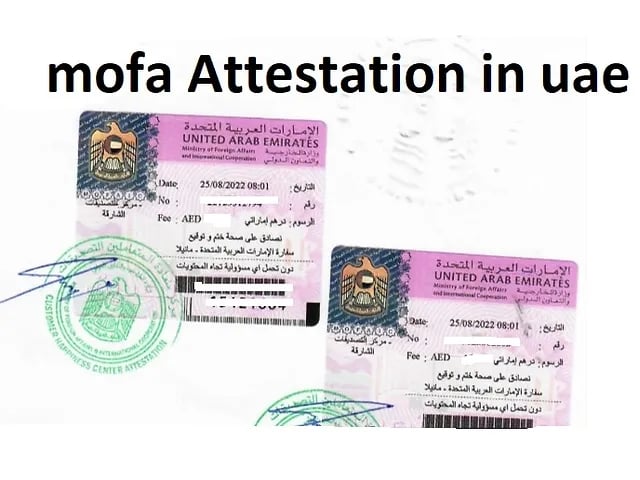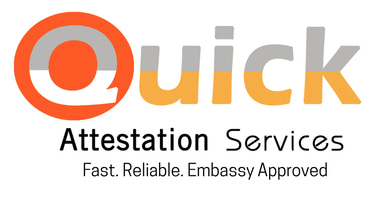UAE MOFA Attestation Guide 2025: Complete Process
Discover the comprehensive UAE MOFA attestation guide for 2025. This article explains the complete embassy attestation process, ensuring you have all the information needed for a smooth experience.
9/15/20257 min read


Introduction to MOFA Attestation
The Ministry of Foreign Affairs and International Cooperation, commonly referred to as MOFA, plays a critical role in the attestation of documents in the United Arab Emirates (UAE). MOFA attestation refers to the official verification process where documents issued by foreign authorities or institutions are authenticated by the UAE government. This procedure is pivotal as it validates the legitimacy of the documents, ensuring their acceptance for various legal purposes within the country.
Understanding the significance of MOFA attestation is essential for anyone intending to work, study, or reside in the UAE. For instance, documents such as educational certificates, marriage licenses, and medical reports often require this form of attestation to fulfill legal formalities. The importance of attesting these documents lies in the fact that they are often needed for employment contracts, residency visas, and further education within the UAE. Without proper attestation, these documents may not hold any legal standing, resulting in complications for individuals and businesses alike.
In the context of legal implications, the absence of MOFA attestation may hinder access to certain services or lead to a denial of visa applications. Furthermore, the attestation process not only serves to authenticate documents but also to ensure that they are compliant with UAE laws and regulations. It reflects a commitment to upholding the rule of law and protecting the integrity of the legal system. As such, understanding the MOFA attestation process is not merely a procedural formality, but rather a fundamental requirement for anyone seeking to engage with the UAE's legal framework.
The Importance of MOFA Attestation
MOFA attestation, conducted by the Ministry of Foreign Affairs in the UAE, holds significant importance for both individuals and businesses. This process ensures that documents possess international recognition, which is crucial in today’s globalized society. Individuals seeking to obtain employment, pursue education, or establish residency in the UAE often find that attested documents, such as educational qualifications and marriage certificates, are indispensable. These documents not only validate the authenticity of an individual’s credentials but also bolster their credibility in the eyes of employers, educational institutions, and governmental authorities.
For expatriates, possessing attested documents can greatly simplify various administrative procedures. For instance, in matters of employment, employers frequently require proof of educational achievements. A non-attested certificate may lead to skepticism and potentially hinder job opportunities, while an attested degree or diploma can instill confidence in prospective employers regarding the validity of a candidate's qualifications. In the context of educational pursuits, students may be required to present attested documents for admission into universities, making MOFA attestation a necessary step in their academic journey.
Moreover, businesses entering or operating within the UAE must understand the implications of document attestation. Whether registering a company, securing licenses, or undertaking legal contracts, attested documents are often mandatory. For instance, business owners need to present attested legal documents to validate their company's standing and compliance with local regulations. This not only expedites the approval processes but also reassures partners and clients of the enterprise’s legitimacy.
In summary, MOFA attestation serves as a vital link in ensuring that personal and business documents are accepted and recognized both within the UAE and internationally. Its role in facilitating the acceptance of essential documents cannot be overstated, making it an indispensable element of the administrative landscape in the region.
Understanding the Attestation Process
The attestation process in the United Arab Emirates (UAE) is essential for ensuring that documents are officially recognized and accepted. The Ministry of Foreign Affairs and International Cooperation (MOFAIC) handles the attestation of documents to verify their authenticity. This process is crucial for expatriates who need to present various documents for employment, residency, or educational purposes.
The first step in the MOFA attestation process involves document preparation. It is vital to gather all necessary documents, which may include educational certificates, commercial documents, or personal records, depending on the intended purpose of the attestation. Each document must be in the appropriate format and may need preliminary attestation from entities such as the relevant Ministry of Education or the Ministry of Health. Ensuring that documents are correctly formatted can significantly expedite the overall attestation process.
Once the documents are prepared, the next step is submission to the MOFA. This can typically be done through authorized typing centers, where the applicant fills out an attestation request form and pays the associated fees. The fees may vary based on the type and number of documents being attested, as well as the urgency of the request. It is important to keep receipts and confirmation details to track the submission status.
The attestation process entails a verification of the provided documents, during which the MOFA will ensure their authenticity. After successful verification, the final stage includes the collection of the attested documents. Depending on the volume of applications, this stage can take anywhere from a few hours to several days. Applicants are advised to plan accordingly and allow for potential delays. Familiarity with these steps can help facilitate a smoother experience during the attestation process in the UAE.
Required Documents for MOFA Attestation
In order to successfully navigate the MOFA attestation process in the UAE, applicants must prepare a comprehensive set of documents to meet the requirements set forth by the Ministry of Foreign Affairs and International Cooperation (MOFAIC). The specific requirements may vary based on the nature of the document being attested, but there are general requirements that apply to all instances of attestation.
Firstly, all applicants are required to submit a valid original document that requires attestation. This could include personal documents such as birth certificates or marriage certificates, educational qualifications like degrees and diplomas, or commercial documents such as corporate agreements. Along with the original, it’s important to have a clear photocopy of the document for MOFA's records.
For personal documents, an additional identification verification is necessary. This typically includes copies of the applicant's passport and residence visa. It ensures the authenticity of the attested document by confirming the identity of the individual requesting the attestation. Educational documents may further require verification from the relevant educational authority before they can be submitted for MOFA attestation. Similarly, commercial documents should include registration certificates and trade licenses for businesses.
Lastly, applicants must also prepare a filled application form for attestation, which can often be downloaded from MOFAIC’s official website, along with the payment receipt for the attestation fee. Ensuring that all documents are accurate and complete is vital to avoid delays in the attestation process. It is advisable to check the MOFAIC website or contact their office for the latest updates regarding required documents, as regulations may change periodically.
Common Mistakes to Avoid
The Ministry of Foreign Affairs (MOFA) attestation process is a critical step for documents that need to be validated for use in the United Arab Emirates (UAE). However, applicants often encounter several common pitfalls that can lead to delays or even outright rejections of their documents. Understanding these mistakes can help applicants navigate the process more efficiently.
One frequent error is the selection of incorrect documents for attestation. Applicants sometimes assume that all documents require attestation; however, only specific documents such as educational certificates, commercial registrations, and personal identification documents typically undergo this process. Understanding which documents are necessary for your particular circumstances is vital to avoid unnecessary delays.
Another notable mistake is the failure to check the specific requirements of the UAE consulate or embassy in your country. Document specifications can vary significantly based on location, including formatting, additional notarization requirements, or the need for translations. Not verifying these details before submission can result in rejections and the need for resubmission, which can prolong the timeline substantially.
Moreover, incomplete applications pose a significant risk. Applicants often overlook required forms or supporting documents. It is essential to follow the guidelines meticulously to ensure that all necessary paperwork is included when submitting to the MOFA. Double-checking the application package can save time and reduce the frustration of having to submit additional documentation later on.
Lastly, some applicants neglect payment instructions, which can hinder the process. Each consulate or embassy may have different payment methods, fees, or procedures that must be adhered to strictly. Familiarizing oneself with these payment requirements prior to application submission helps to ensure a smoother experience.
Incorporating these considerations will significantly improve the likelihood of successful and timely MOFA attestation.
Costs and Duration of the Attestation Process
The process of obtaining MOFA attestation in the UAE involves various costs and durations that individuals must consider. Understanding these financial and temporal commitments can help applicants better prepare for the procedure.
When looking at costs, the official MOFA attestation fee generally varies depending on the type of document to be attested. As of 2023, the fees can range anywhere from AED 100 to AED 200 for standard documents. However, additional documentation or expedited services may incur higher charges. For instance, if a person opts to use a professional service or an agent to assist with the application, this may add another AED 200 to AED 500 to the total cost. It is essential to account for these potential service charges when budgeting for the attestation process.
Furthermore, there are other incidental expenses such as transportation costs to the embassy or consulate, photocopying fees, and costs for additional certifications that may be required before heading to MOFA. These expenses can cumulatively contribute to the overall financial implications of obtaining MOFA attestation.
Regarding the duration of the attestation process, this can vary significantly based on several factors. Generally, applicants can expect the process to take anywhere from a few days to several weeks. The timeline often depends on the complexity of the documents being attested, the workload of the embassy or MOFA, and the processing method selected (standard vs. expedited). Moreover, any discrepancies or issues with the documents may lead to further delays. Hence, it is advisable for applicants to initiate the attestation process well in advance of any impending deadlines to ensure timely completion.
Conclusion and Final Thoughts
In summary, understanding the Embassy attestation process, specifically in the context of UAE MOFA attestation, is paramount for anyone involved in international documentation. Throughout this guide, we have outlined the essential steps and requirements necessary for obtaining MOFA attestation in 2025. This process not only ensures the validity of your documents for use in the UAE but also facilitates smoother interactions with local authorities and organizations.
It is critical to recognize the significance of timely preparation. As we have discussed, the MOFA attestation process involves multiple stages, including document verification and submission to the required authorities. Each phase carries its own timeline and prerequisites, which can vary based on the type of document being attested. Therefore, being well-informed about these stages enables individuals and organizations to avoid unnecessary delays and complications.
Furthermore, the importance of keeping abreast of any changes in regulations or procedures cannot be overstated. The international landscape is consistently evolving, and what may hold true today could change unexpectedly in the future. By maintaining vigilance and staying educated about the MOFA attestation guidelines, applicants can better prepare for the complexities that may arise in the attestation journey.
Ultimately, a proactive approach will not only enhance your understanding of the process but also instill confidence in your dealings with the UAE's MOFA. As you embark on your attestation endeavors in 2025, remember that careful planning and informed execution are crucial to navigating this important process successfully. By taking these considerations into account, you can ensure your documentation meets the necessary standards for affirmation in the UAE.
